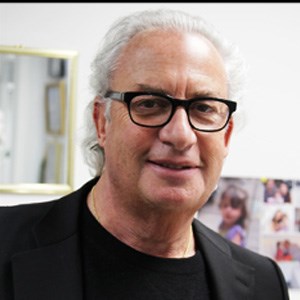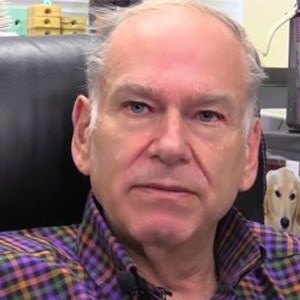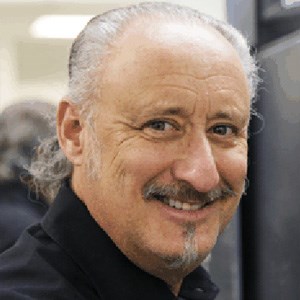Founders of Carrera Casting
 Owen Schwartz, President
Owen Schwartz, President
Owen.Schwartz@CarreraCasting.com | Ext:270
As head of one of the leading jewelry casting houses in the country, how did your journey begin?
Well, I started back in 1969 as a bench jeweler for my father's company, Montreaux Jewelry, which at the time was very successful. I was an apprentice, and I learned the trade from the ground up. But in addition, I took instruction in diamond-setting after hours, from the great Teddy Einhorn, and I acquired a rich knowledge of the technical and creative aspects of jewelry.
During that first five or six years in the industry, I developed a strong interest in the business side of things. I wanted sales, I wanted account management, and general management as well. My brother, Eric, was also in the business and he had decided to get into casting as an independent. So, in 1975, I made "the big decision" and I left Montreaux to join Eric. Eric had set up shop in the same building we are located now, and I went right out there, selling casting services door-to-door for the new company. Joel Weiss was working over at Hamilton, which was where Montreaux had its casting done - and I had been in contact with Joel on a daily basis for years. He joined Carrera as well, and before I knew it, we had the makings of a very talented team.
What lessons did you learn over the years that led to your current success?
Earning the trust of the customer is certainly at the top of the list. For our customers to be successful in the marketplace, they need to keep their designs completely confidential. Over the years, we have built a solid reputation on that front - so when a customer walks through our doors, they can rest assured, no one else gets to see their designs, and we go to excessive lengths to make sure it stays that way.
Next, I would say, interactivity with the customer - building solid relationships that can last for decades - is crucial. We want to be there for them, we want to give them the right advice and we want them to succeed in what they are doing - not only because it helps us, but because it helps them - and it helps the industry. Our customers like us - even love us - they trust Carrera Casting, and they know we're working hard to make their journey a profitable one.
Lastly, a long time ago, I learned from my father - and the way he ran his business - that you can't do everything yourself. It's just not possible. So you have to surround yourself with the most talented people to satisfy the exacting demands of customers. And that is what we have done at Carrera. Our three partners are highly talented in what they do - the managers are some of the best and most dedicated people in the industry - and I can confidently say the same about everyone in this shop.
You have been in the casting business for over 35 years. What drives you to get up in the morning and come to work?
A number of things. First, it is very exciting to have built a casting house that attracts the best and most demanding jewelry designers, makers and marketers in the industry. Each design that is brought to us is unique in the challenges it presents in terms of casting and allowances for finishing. It is really our customers that make us who we are. We are dedicated to quality and satisfaction, whether it is a longer production run or a single piece. I find that exciting, and it motivates me to come to work.
But equally important, at this stage in my career, it's important to be developing and reaching out to the generation of jewelry designers. That is why we invite students to come here to learn about casting. Teaching young people how we do things helps maintain a thriving industry. And perhaps some of these students will come to work here someday, or even become a customer. That is terrific, to be able to do that for them.
Above all, I continue to be very interested in our business and in our customers. As a partner here for over 35 years, it would be so easy to delegate my responsibilities and hide in my office behind closed doors. Instead, I make it a point to be out there on the floor every day, to detect and solve problems, to make sure we incorporate the latest technology, and discover how we can do things better.
So even now, working at Carrera Casting is absolutely one of the great joys of my life.
 Joel Weiss, Vice President
Joel Weiss, Vice President
Redwineonly@hotmail.com | Ext:269
How did you get started in the casting business?
I was just a typical kid born and raised in Brooklyn - went to Erasmus Hall High School. After high school, I couldn't decide what it was I wanted to do, and ended up working on Wall Street. I quickly realized, this was not what I wanted to do for the rest of my life. So with no better prospects, I found a job at Hamilton Casting with the help of my dad. I started at the bottom, and after just a few years, ended up managing the office, controlling the metals, cutting molds, and casting in the factory. So early on, I knew a lot about jewelry from many different angles.
What led you to join Carrera Casting?
Montreaux Jewelry was one of Hamilton's largest customers at that time, and so I knew Owen Schwartz very well. In fact, we spoke so often on the phone, we eventually had a tie line installed so we could just chat any time we needed to.
Eric and Owen knew I was looking to start my own business, so when Carrera opened its doors, I was invited to be a partner. I have to say, it was risky going in with two brothers, but knowing the reputation of the Schwartz family, I knew this would be a solid opportunity. In the end, they were always very professional with me, and they knew I had a special role to play - I have been treated as an equal partner ever since.
What I brought to Carrera was customers, and knowledge. At Hamilton, I had learned the casting business from the ground up, and what we were attempting to build at Carrera was a mini-Hamilton, with best-quality, absolute integrity and no product line of our own so that customers could feel totally comfortable. This was our objective in those early days, and I played a big part in making that happen.
How did your role evolve?
When you start a business, everyone does a little bit of everything, of course, mainly because you're short-staffed - but you also want to learn all there is to know. As time passed, my activities, and my partners' activities, gravitated toward what each of us did best. For me, this has been customer relations, or what they now call CRM.
If you're running a quality shop like Carrera, the rule is, the selling process never ends. And so, building long-lasting relationships with customers is my mission. I am very active in industry organizations. In fact, I was honored to become a member of the 24 KT Club of New York. I make it my business to press the flesh with the "who's who" of the jewelry business, and I am very involved with customers on a daily basis. I am the one who advises customers on their business, make credit decisions, collect receivables, etc. - I have my finger on the pulse of the customer. And that is my passion - it's what I love.
Where is the jewelry business going and how does Carrera fit in?
There are three reasons why I believe Carrera is here for the long haul...
1) First, the future of the jewelry industry is in the hands of the young, independent designer. Years ago, to be successful, a jewelry companies needed their own factory, and they were really involved with the full spectrum of production. Today, young designers come out of school, and they want to be independent almost from the beginning of their careers. But their training is in design, and unless their family is in the business, they probably have little experience in bringing their products to market.
Not only is Carrera the best company for them to cast their fine jewelry, I also use my vast industry network to refer our customers to the most talented people who can help them complete their projects. This value-added approach of placing our customers in the best industry circles is crucial for the up-and-coming designer who wants to be successful, and I am personally dedicated to helping designers do what they do best.
2) Secondly, foreign competition has affected the future of this industry. As China's production capacity expanded over the past decade, when designers saw the cheaper prices, too many of them were tempted to bring their casting business over there. It forced all the domestic casting companies to contract. But gradually, those people who went off-shore realized two things -- one, that more of their product was being "knocked off" - and two, that the quality was just not there. Jewelry makers eventually realized, it made sense to do certain types of work back in the U.S.
In reaction to all of this, we as a company we decided to consolidate and to play to our strengths - which is high-end jewelry. Today I think people in the industry know that if they want meticulous quality, they are going to cast their creations at Carrera, not some factory in China.
3) Thirdly, it used to be that virtually the entire jewelry industry was situated in midtown Manhattan. Today's talented designers can be found all over the country. And in line with that, our order process allows a Carrera customer to be anywhere in America, and still get the same great quality and service, as if they came right through our front door.
I think there will always be a place for Carrera Casting in this industry. Fine jewelry is a physical product that requires knowledge and expertise to make. The demand for high quality, customer confidentiality and speed to market will always be there and all of those things are what we do best. And as a partner here, I make it my personal business to help clients make the most of their product in as timely a fashion as possible.
 Eric Schwartz, Chairman
Eric Schwartz, Chairman
Eric.Schwartz@CarreraCasting.com | Ext:231
What was your path, becoming the technical head of America's largest casting company?
My brother, Owen, and I grew up in the Brownsville section of Brooklyn. When I was eight years old, we followed the general trend of moving to the suburbs, and we ended up in Merrick, Long Island. In my senior year of high school, I became interested in two occupations - meteorologist and dental technologies. Training for these jobs would have required going to college out of town - but as fate would have it, I fell in love, and didn't want to sacrifice my relationship. So I decided to attend Nassau Community College.
My summers were spent at the bench at Montreaux working on jewelry. I didn't love it, but I became very curious about metal casting. And the reason was, when we received castings from our vendors, I noticed small imperfections, and I actually thought I could do a better job than some of our suppliers. The challenge of producing perfect castings interested me immensely.
So out of school, I started working at Kelman Brothers, and I learned the process. After a few months, the owners noticed metal losses were actually going down since I had started working there, and they thought I had some talent.
As part of my job, I used to frequent casting supply houses and it was then that I met Larry Weiss, Joel's father. I was planning to open up a small casting company of my own, and Larry and I started having lunch together to talk shop, and it was just a great relationship because we were both intellectually on the same page. We wanted to solve problems and understand what could lead to better results under various conditions.
Turns out, Kelman was going to let some people go, and I sacrificed myself, knowing that I would be starting my own business soon, anyway. I quickly got a job at another shop, but as Fate would have it, they were terrible! They had no new equipment, they would not invest in their business, and all of this gave me the impetus to go on my own that much faster.
So in 1975, I took the plunge. My father put up the money, I hired a waxer, someone who makes waxes from molds, and a helper - and Carrera Casting was born.
What technical challenges did you confront and how did you solve them?
In the early days, Larry Weiss would come up at lunchtime and we'd talk theory. Casting metal is a science, but it's also an art. That is to say, the variables - the ideal temperatures - the percentage of water used in the plaster - what alloys to use - they are all about "science." But unless you are really creative and can experiment intelligently, and can decipher what is really going on in the process, you will never be successful.
As an example, for every piece of new equipment you buy, the suppliers give you an instruction sheet, but that's just a starting point. There is weather and building conditions and dozens of other factors that affect the performance of that equipment. So we calibrate and we adjust and we tinker until we have fine-tuned our equipment to perfection, or close to it.
I have an x-ray machine that measures metal composition. I was told by an expert that my machine is so well-calibrated, it works better and more accurately than any other he has seen, simply because I tune it to work right here - in our facility.
I'm a perfectionist, and admittedly, there's a little bit of ego involved in all of this. When I see a really great casting I want to show it to the world. And I study the conditions and the process we used that made it that way, so that we can do it again. It's passion and it's persistence that makes me want to do this for so long.
How do you interact with customers?
My expertise is in the casting process and I love to share that expertise with customers - that's what drives me in this business.. It has gotten to the point where, if someone were to bring me a piece of jewelry that is not quite right, nine chances out of ten, I can tell exactly what went wrong and how to solve that particular issue.
If you think about it, metal was not meant to be made into jewelry. It's just stuff buried in the earth, so it doesn't always cooperate. Taking control of that metal is a challenge, but the customer doesn't always appreciate that. They want as close to perfection as they can get, and they want results quickly. So, if necessary, I will keep this shop open until we get it right - even if we lose money. Because for us, it's not the individual project that matters, it's the customer relationship that we are working for.
When I meet a young designer and they come and show me their work, I know immediately if this person has any talent. If a talented designer needs special guidance, I give it to them because that is what people gave me when I started out.
So in effect, to be the best in the casting business, and I believe we are, you must have an analytical mind, but also a creative mind, and you have to be dedicated to the customer, and build relationships with them. This is what makes Carrera the best place to come for what we do.